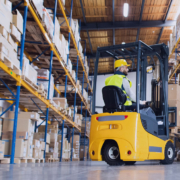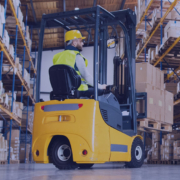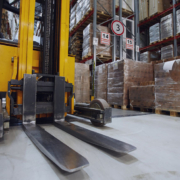E-commerce alone has been responsible for over 4 trillion in revenue within the past years, accounting for a much larger significant part of global retail sales compared to five years ago. Combined with current labor shortages and breakdowns in international logistics systems, warehouses must navigate through a series of challenges to keep up with demands and growth. Studies conducted by leading automation experts have highlighted the following challenges affecting today’s warehouses and distribution centers:
- Labor shortages and low retention rates
- Low warehouse capacity compared to higher product demand
- Rising number of dynamic e-commerce transactions (BOPIS, rentals, direct-to-customer, etc.)
- Employee safety, particularly at the loading dock, where 25% of worker accidents happen
- Adaptable cyberthreats targeting digital devices, including peripheral hardware like printers
It’s important to remember that these issues come alongside challenges unique to individual warehouses such as location, cold storage management, peak seasons, and other possible impacts. To minimize downtime and complications, Avalon partners with Zebra Technologies to highlight four solutions developed to secure productive uptime amidst today’s challenges.
- Consolidated data capture and processing – Manual data entry is both time-consuming and complex, making it difficult for new hires to adopt. Moreover, inefficient reporting can create problems later down the road if data isn’t readily available for audits and compliance verification. As warehouse management systems are selected, supporting devices should streamline automated data capture and computing for real-time inventory and workflow visibility. Zebra’s newest WS50 wearable computer exemplifies this by integrating an intelligent scanner within a lightweight touchscreen device that mounts to the worker’s wrist and connects with the WMS.
- Automatic Mobile Robots (AMRs) – To address both labor shortages and employee safety concerns, AMRs come alongside the human workforce to empower faster picking with less travel time since they can move pallets and orders between loading docks. Although many warehouse workers may fear robots will displace their jobs, studies show that at least 73% of decision makers are actually looking to support human labor with robotics in partial automation plans. This means employees would be empowered to work smarter with less physical strain while robotics do the literal heavy lifting.
- Touch-free validation scanning – One in five online shoppers will return an order because the wrong item was shipped. As a result, order validation has become crucial to securing long-lasting customer loyalty. Because workers face shorter delivery timeframes and increased thoughts, touchless order validation through systems like Zebra’s SLS portals have proven beneficial to check order accuracy without pausing productivity. As orders are validated at the loading dock, warehouses can notify customers of accurate orders, thus also satisfying demands for real-time tracking.
- Adaptable RFID data capture – Because of its 99.9% accuracy rate, it’s no surprise that at least 35% of warehouses are choosing to deploy RFID. However, not every RFID system accommodates varying device types. Adaptable devices like the RFD90 can adjust to iOS, Windows, and Android devices to enable RFID scanning with your preferred device, consequently lowering training times since workers don’t need to upgrade entire handheld systems.
Small steps can take you far.
While these new technologies represent the latest edge in modernized warehousing, effective adaptability can start with smaller implementations such as automating data capture and reporting or migrating to Android. Programs such as the GO Zebra Trade-In provide a cost-effective start to upgraded modernization. By swapping out legacy devices to newer Zebra hardware, operations can integrate:
- Automated data capture
- Secured data protection
- Greater device durability
- Faster printing speeds
- Mobile printing
- Push-to-talk connectivity
- Adaptable WiFi support
- High-volume printing
Because every business is inherently unique, Avalon recommends starting an operational assessment before selecting possible modernization strategies. By meeting with a technology expert, businesses can prioritize optimization areas to decide between large-scale implementations or smaller changes. By ensuring scalability, warehouses can best prepare to address new future obstacles that are sure to come.












